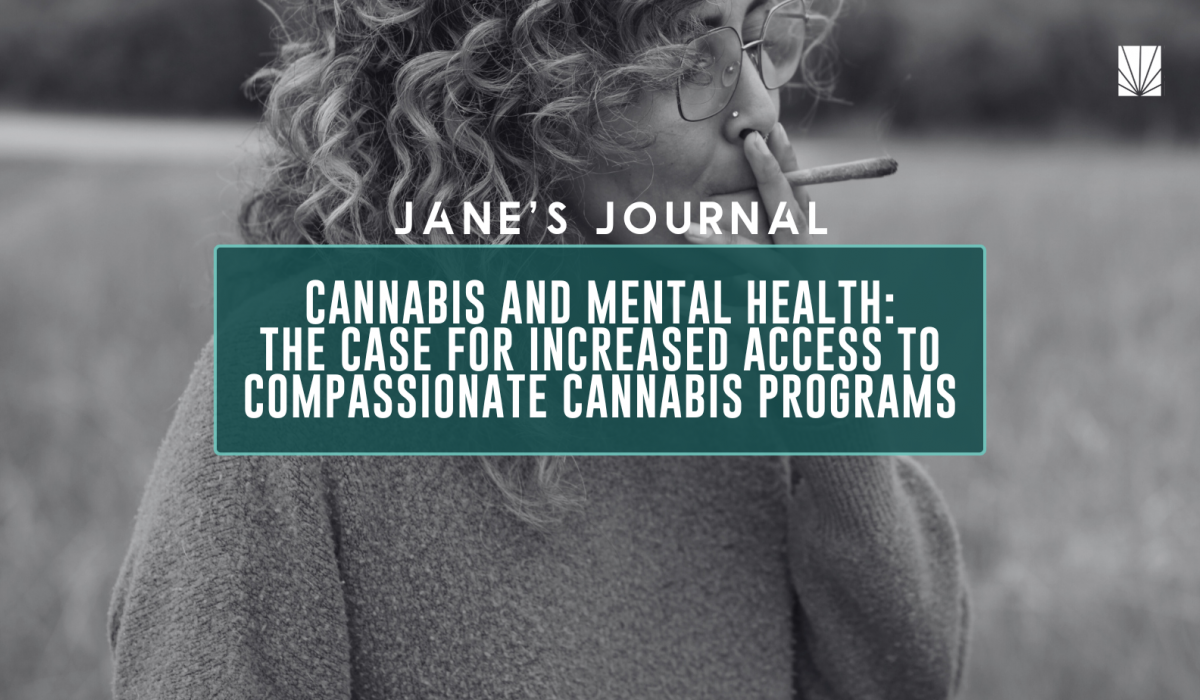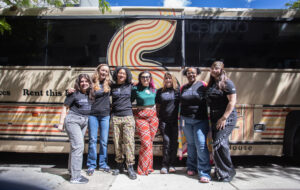
Cannabis and Mental Health: The Case for Increased Access To Compassionate Cannabis Donations
The intersection of cannabis and mental health has been a topic of growing relevance and debate in recent years. As research continues to unveil the potential benefits of cannabis for various mental health conditions and laws continue to pass creating pathways for recreational and medical patients nationwide, it’s crucial to examine the role compassionate cannabis donations play in providing access to those who need it most.

Compassionate donation programs, which provide free or low-cost cannabis to individuals in need, could bridge the gap between clinical benefits and financial accessibility. Such initiatives, like those facilitated by CA non-profits (This is Jane Project and Weed for Warriors Project, for example) not only align with ethical imperatives but also promote broader social and public health outcomes by reducing disparities in mental health treatment. By critically examining current research and policy frameworks, this article advocates for the integration of compassionate cannabis donations into mental health care strategies, fostering a more inclusive approach to mental health and well-being.
Continue on to explore the history, evolution, and current state of compassionate cannabis programs, their intersection with the growing mental health crisis, and spotlights California’s pioneering efforts as well as the key organizations making a difference.
The History and Evolution of Compassionate Cannabis Donations
CA Proposition 215: A Response to the HIV/AIDS Epidemic
In 1996, California voters approved Proposition 215, also known as the Compassionate Use Act. This groundbreaking legislation was a direct response to the HIV/AIDS epidemic, recognizing the urgent need for alternative treatments to alleviate the suffering for an already oppressed community. Prop 215 not only provided a legal pathway for medical cannabis use but also served as a crucial support system for those facing mental health challenges while battling life-threatening illnesses.
** It’s important to note that while Prop 215 provided possibilities for mental health treatment, it also sparked ongoing debates about the efficacy and potential risks of using cannabis to treat mental health conditions.
The full impact of this legislation on mental health care in California continues to be studied and debated. The challenge lies in maximizing therapeutic benefits, like pain relief, while minimizing negative consequences. Achieving this balance necessitates comprehensive, controlled studies that evaluate both the therapeutic and adverse effects.
Special thanks to organizations like The Network of Applied Pharmacology, Americans for Safe Access, Colorado Department of Public Health and Environment, and NORML who remain committed to providing unbiased benefits and risks based research.
Proposition 64: The Pathway to Adult-Use, Recreational Sales
Building on the foundation laid by Prop 215, California continued to lead the way in cannabis reform. In 2016, voters passed Proposition 64, which legalized adult-use cannabis, allowing adults age 21+ to possess, transport, purchase, consume and share up to an ounce of nonmedical cannabis and eight grams of nonmedical concentrates, and grow up to six plants at home.
SB-34, Dennis Peron and Brownie Mary Act

However, it was the subsequent Dennis Peron and Brownie Mary Act that truly honored the spirit of compassionate care. This legislation, named after two lesser-known but influential activists, ensured that compliant, tax-free donations of cannabis to qualified patients could continue.
** It took two years of organizing, advocating, and lobbying to return Compassionate Care programs to California through Senate Bill 34. The bill was vetoed by Jerry Brown in 2018, then signed by Governor Newsom in October 2019.
Assembly Bill 2555 (AB-2555)
In 2024, California further solidified its commitment to compassionate cannabis with the passage of Assembly Bill 2555 (AB-2555) thanks in large part to LA NORML. This legislation allows for the continuation of compliant, tax-free donations to qualified patients, ensuring that those in need could still access cannabis without financial burden. This revolutionary bill was set to sunset in 2024, which would prevent the SB-34 donations many patients relied on.
Our own Executive Director, Shannon DeGrooms, testified at the taxation committee hearing in support of the bill spearheaded by a coalition of other conduits of compassion.
Thank you to all those who invested the sweat, emotional, and financial equity into this work.
Talia D’Amato (she/her, they/them), Legislative Aide, working on issues of: cannabis consumer rights; the cannabis industry; Native American, Indigenous, and Tribal social, cultural and economic rights; animal rights.
Sandra Bacon (she/her), Longtime member of Compassionate Veterans and an activist until her transition last month. It was her comments during the hearing that brought bipartisan laughter, and thus, more legitimacy to the Assembly Bill. May she rest in power, peacefully, and free of physical pain.
Ellen Komp (she/her), Deputy Director, Cal NORML, has been a hemp/marijuana activist since 1991 and her support was critical to AB-2555’s success. Ellen was a volunteer petitioner for the California Hemp Initiative (93’/94’) and Proposition 215 (1995). She also edited the 9th edition of The Emperor Wears No Clothes by Jack Herer!
Dale Gieringer (he/him), Director, Cal NORML, who, in 1994 published a Harvard paper on the economics of legalizing marijuana. He went on to help organize and write the 1996 initiative Proposition 215– the seed from which compassionate cannabis was born. However this tree grows, and how wide reaching its branches are is because of people like Dale.
Nicole Redler (she/her), Founder/CEO ReCompass, who, after hearing the many stories of veterans and patients who lacked sustainable access, helped develop the Eaze compassion program in 2021. Since leaving Eaze, Nicole remains committed to compassionate access by bridging the gap between operators and underserved communities through efficient, compliant, and compassionate donation services provided by ReCompass.
Additional thanks: Eric Goepel, Nate Landau, Richard G. Miller, Sarah Armstrong & Amy Jenkins.
California’s Unique Position

It’s worth highlighting that California stands alone in its comprehensive approach to cannabis donation pathways. To our knowledge, it is the only state with specific legislation allowing partners across the supply chain to donate cannabis to patients in need with zero tax burden to retailers and brands.
This progressive stance sets a powerful example for other states to follow; and, until then This Is Jane Project will continue to experiment with creative solutions to getting medicine in the hands of Janes, and all patients.
Organizations Facilitating Compassion Donations
Several organizations are at the forefront of facilitating compassionate cannabis donations in California and beyond:
- Weed for Warriors Project: Serving many California cities
- This is Jane Project: Los Angeles, Denver, Chicago, and Bordentown, NJ
- Compassionate Veterans (formerly Operation E.V.A.C.
- Watch a video about this amazing organization by Scary Plants Media
- Hella Positive: Serving Oakland, CA
If we forgot any, please let us know! These organizations play a crucial role in bridging the gap between clinical benefits and financial accessibility. By providing free or low-cost cannabis to individuals in need, they not only align with ethical imperatives but also promote broader social and public health outcomes by reducing disparities in mental health treatment.
Stats about Mental Health and Medical Cannabis Users
People against the use of cannabis for mental health commonly cite the lack of scientific research as their main concern; an idea further emboldened by the vast number of studies already done on the plant’s pharmaceutical counterparts. However, as public opinion changes and stigma continues to be reduced, more and more studies are emerging. In fact, there is already research that supports the efficacy of cannabis for improving mental health.
A 2023 Forbes article shared evidence in support of the use of cannabis for PTSD. This first study of its kind, showed promise as well as evidence that cannabis can help trauma survivors experience 2.57x reduction in PTSD symptoms.
Signs of PTSD recognized by the American Psychological Association (ASA) include recurring intrusive thoughts and memories, nightmares, flashbacks, anxiety, avoidance, irrational thoughts, emotional distress, hyper-reactivity and often various other unwanted symptoms.
Another study from Medical News Today in 2017 revealed that “regular cannabis users have significantly lower levels of cortisol found in their saliva – a distinctive stress response – compared to non-users when exposed to both physical and psychologically stressful stimuli”.
Findings from the National Industry of Medicine suggests adults with chronic pain, patients who were treated with cannabis or cannabinoids are more likely to experience a clinically significant reduction in pain symptoms.

Bridging the Access Gap
Organizations like This is Jane Project and others are leading the charge in bridging the access gap through compliant, creative solutions. Their efforts are paving the way for other states to catch up with California’s patient-first approach. It’s important to remember that it was because of patients and advocates that we have legal cannabis in the first place.
How to Get Involved
Finding Compassionate Cannabis Programs in Your Area
- Check state medical cannabis websites for directories of licensed dispensaries offering compassionate care initiatives,
- Explore nonprofit networks like Americans for Safe Access (ASA) and the Cannabis Compassionate Use Alliance (CCUA) for comprehensive lists of programs.
- Inquire at local dispensaries about their participation in compassionate care programs or connections to relevant nonprofit organizations.
- Veterans and special populations can connect with programs like Weed for Warriors and This is Jane Project for specialized support.
Supporting Compassionate Cannabis
- Volunteer with organizations providing compassionate care. (wink, wink: TIJP is always looking for committed volunteers. Apply here today.)
- Participate in policy advocacy to push for more inclusive legislation.
- Share educational resources to raise awareness about the need for cannabis donation programs.
- Speak out against the continued criminalization of cannabis, particularly in communities disproportionately affected by the War on Drugs, and direct folks to organizations supporting justice-impacted people like The Social Impact Center.
A Call to Action: Uniting for a More Compassionate Future

The compassionate cannabis movement demonstrates the power of collective action in building a more just and healing world. However, there is still much work to be done to ensure access to cannabis for all who need it– in every state. This movement belongs to all of us and calls on us to recognize the profound healing potential of cannabis while ensuring that those in need are not left behind.
Organizations like This Is Jane Project are committed to this vision of access-centered compassionate cannabis donations. We invite you to join our community, attend upcoming events, and become part of this growing movement. By staying connected and supporting compassionate cannabis initiatives, we can create a future where healing and justice are accessible to everyone, not simply those who can afford the high price of legal cannabis.
california compassionate cannabis, cannabis accessibility, cannabis and mental health, cannabis therapy, compassionate cannabis, compassionate cannabis programs, history of compassionate cannabis, mental health

Denise
What great information. Thank you for letting me join Jane’s project. I really enjoyed reading the information. Love the Jane’s project!